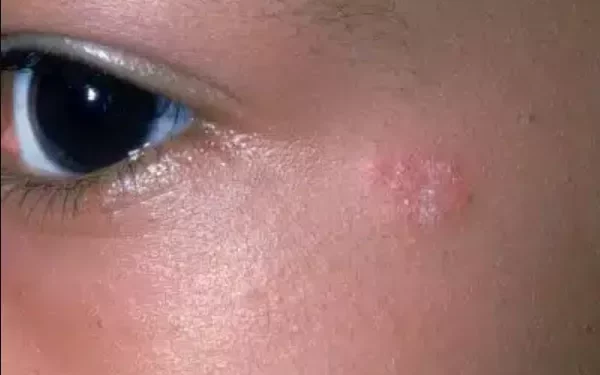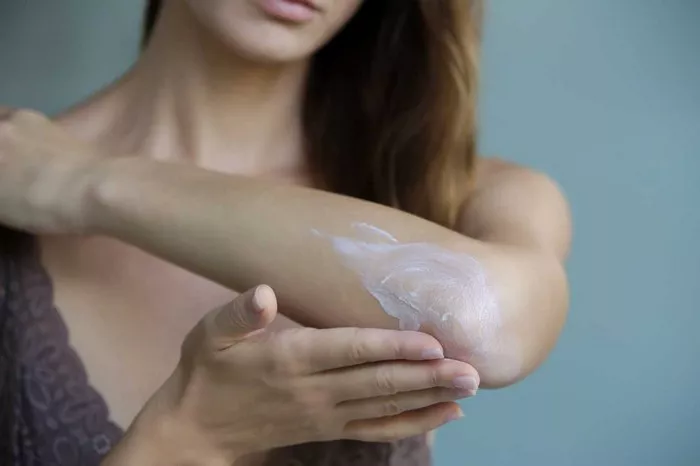Ringworm, despite its name, is not caused by a worm. It is a common fungal infection that can affect various parts of the body, including the skin on your face. Understanding what ringworm is, how it spreads, and how to treat it can help you manage the condition effectively if ringworm happens to occur on your face.
What is Ringworm?
Ringworm, medically known as tinea corporis, is a fungal infection that affects the skin. It is characterized by round, red patches that often have a raised border and a clear center. The infection is caused by fungi that thrive in warm, moist environments. These fungi are known as dermatophytes, and they can infect the skin, hair, and nails.
Ringworm is highly contagious and can spread through direct skin-to-skin contact with an infected person or by touching contaminated surfaces. It can also be transmitted by animals, especially pets like cats and dogs that carry the fungi.
Can Ringworm Affect Your Face?
Yes, ringworm can affect the skin on your face. While the condition commonly affects areas like the arms, legs, and torso, it is not unusual for it to spread to the face, particularly around the eyes, mouth, and chin. When ringworm occurs on the face, it is usually referred to as tinea faciei.
The symptoms of ringworm on the face are similar to those found on other parts of the body. It typically starts as small, red spots or patches that grow over time. These patches may become scaly, itchy, or inflamed, and in some cases, the edges of the patch can appear raised. In severe cases, the infection can lead to the development of sores, which may become infected if scratched.
What Causes Ringworm on the Face?
Ringworm is caused by dermatophytes, a type of fungi that feed on keratin, a protein found in the skin, hair, and nails. These fungi thrive in warm, humid environments, which is why they are commonly found in areas like gyms, locker rooms, and public swimming pools.
There are several ways you can contract ringworm on your face:
Direct contact with an infected person: Ringworm is contagious and can spread easily from one person to another through skin-to-skin contact.
Contact with contaminated surfaces: The fungi can live on surfaces such as towels, bed linens, and clothing, making it easy to pick up ringworm from these items.
Animal exposure: Pets, especially cats and dogs, can carry the fungi and spread them to humans. If your pet has ringworm, you may contract it from touching them or their bedding.
Poor hygiene: Not washing your face regularly or touching your face with dirty hands can introduce the fungi to the skin. Keeping your face clean can reduce the risk of infection.
Weakened immune system: People with weakened immune systems, such as those undergoing chemotherapy or living with certain chronic conditions, are more susceptible to fungal infections like ringworm.
How to Recognize Ringworm on the Face
Recognizing ringworm on your face is key to identifying it early and seeking treatment. Common signs of ringworm on the face include:
Red, round patches: These patches may be pink or red in color and often have a raised, scaly border. They may also have a clear or lighter center.
Itchiness: The affected area may be itchy or uncomfortable, although not everyone with ringworm experiences itching.
Scaling and flaking: The edges of the affected skin can become dry and flaky.
Sores or blisters: In some cases, ringworm can develop into blisters or open sores, especially if it is scratched or irritated.
Swelling: The skin around the affected area may become swollen or inflamed.
It is important to differentiate ringworm from other skin conditions that may appear similar, such as eczema, psoriasis, or impetigo. If you’re unsure, it’s best to consult a healthcare professional for an accurate diagnosis.
How Does Ringworm Spread?
Ringworm spreads through direct contact with an infected person, animal, or surface. The fungi that cause ringworm can survive for a long time on various surfaces, which is why the infection can spread in public spaces like gyms, swimming pools, and locker rooms.
It can also be transmitted through indirect contact, such as sharing towels, combs, or makeup. If you touch an infected area of your skin or an infected surface, you can spread the fungi to other parts of your body, including your face.
How to Prevent Ringworm on the Face
While ringworm can be highly contagious, there are several steps you can take to prevent it from spreading to your face:
Wash your hands regularly: Wash your hands with soap and water after touching potentially contaminated surfaces or animals. This is the best way to avoid transferring the fungi to your face.
Avoid touching your face: Try not to touch your face, especially if you have been in contact with an infected area or animal. Dirty hands can introduce the fungi to your skin.
Keep your face clean: Wash your face daily with a gentle cleanser to remove dirt, sweat, and oil. Keeping your skin clean reduces the likelihood of fungal infections.
Don’t share personal items: Avoid sharing towels, makeup, or other personal items with others, especially if you suspect someone may have ringworm.
Treat pets for ringworm: If your pet has ringworm, make sure to get them treated and take precautions to avoid contact until the infection is cleared up.
Practice good hygiene: In public places, always wear flip-flops in locker rooms, gyms, or public showers to prevent exposure to contaminated floors.
How to Treat Ringworm on the Face
If you develop ringworm on your face, it is important to start treatment as soon as possible to avoid spreading the infection and to relieve symptoms. Here are some common treatments for ringworm on the face:
Topical antifungal creams: Over-the-counter antifungal creams, ointments, or lotions are often the first line of treatment for ringworm. These products contain active ingredients like clotrimazole, miconazole, or terbinafine, which can help kill the fungi causing the infection. Apply the cream to the affected area as directed by the product instructions, usually once or twice a day.
Oral antifungal medication: If the infection is severe or does not respond to topical treatments, your doctor may prescribe oral antifungal medications like terbinafine or itraconazole. These medications work from the inside to eliminate the fungal infection.
Keep the affected area clean and dry: Fungi thrive in warm, moist environments, so it is essential to keep the infected area dry. Avoid scratching the infected patches, as this can lead to further irritation or secondary bacterial infections.
Avoid sun exposure: Although sunlight can sometimes help clear up fungal infections, excessive sun exposure can irritate the skin, especially if you are already using antifungal creams. It’s best to avoid direct sun exposure while the infection is healing.
Consult a doctor: If you are unsure whether your skin condition is ringworm, or if the infection is not improving with over-the-counter treatments, seek advice from a healthcare professional. They may perform a skin culture or a microscopic examination to confirm the diagnosis and recommend the best treatment.
When to Seek Medical Attention
While ringworm can typically be treated with over-the-counter antifungal creams, you should seek medical attention in the following situations:
Severe or widespread infection: If the ringworm spreads beyond the face or causes a significant amount of discomfort, you may need prescription-strength treatment.
Failure to improve: If the infection does not improve after a few weeks of treatment, it could be a sign that you need stronger medication.
Infection around the eyes or mouth: Ringworm near the eyes or mouth may require special care, as these areas are sensitive, and the infection may cause more severe symptoms.
If you have a weakened immune system: People with weakened immune systems are more susceptible to infections and may require a different treatment approach.
Conclusion
Ringworm can indeed affect your face, causing red, itchy, and scaly patches. It is caused by fungi that thrive in warm, moist environments and can spread easily through direct contact with infected individuals, animals, or surfaces. While it is contagious, taking simple precautions like washing your hands, avoiding touching your face, and treating the infection early can help prevent the spread of ringworm and allow it to heal quickly.
If you suspect you have ringworm on your face, start by using over-the-counter antifungal creams. If the infection persists or worsens, consult a healthcare professional for further treatment options. With the right care, ringworm can be treated effectively and prevent further complications.
Related topics



























